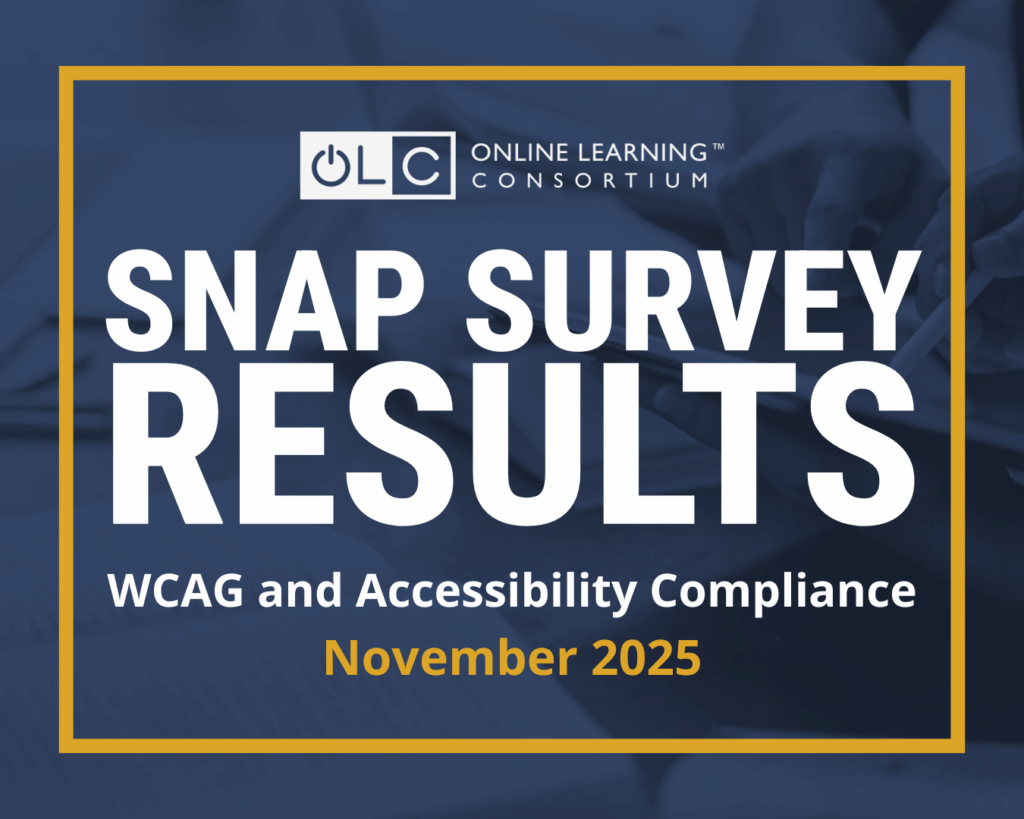If you’ve looked through our recently-released Course Review Scorecard, you may have noticed that two of the accessibility-focused objectives show up in the Advanced Design section rather than the Essential Design section. We’ve had a few inquiries about why we made that decision, so I’m writing to assure you that this is a feature, not a bug. In fact, we anticipated this very reasonable question from those in our community who hold accessibility near and dear to their hearts. Trust me, we do as well.
So what led us to locate those accessibility objectives in the Advanced Design section? Well, it’s a decision based upon our design philosophy and an awareness of the practical challenges instructors face when designing an online course. It might help to start with a short analogy.
With a terminal degree in English, I’ve taught my fair share of composition courses. There is a misconception out there that teachers of writing focus their attention on grammar and mechanics. I suppose some do, but every comp program I’ve taught for first prioritized higher order skills like critically engaging with texts, developing effective arguments, and actually saying something of value. Student writing, like any writing, can be grammatically flawless yet vapid and meaningless. On the flip side, conveying complex ideas in writing is sometimes a frustrating, convoluted process that results in a rather ugly but more meaningful product.
I want to be clear here: Producing writing that meets standard grammatical conventions is very important for successful communication. However, for beginning collegiate writers, focusing too much on correctness can interfere with the hard work of meaning-making.
As with student writing, online courses can perfectly meet accessibility standards but end up not engaging learners effectively, not contributing to student learning, and not saying anything of value. For instructors new to online teaching, or who are teaching a new-to-them online course, or who have been given only a weekend to prep an online course (it happens), making sure all videos are 100% accurately captioned is critical time that could be better spent refining learning objectives, writing effective assignment prompts, and outlining strategies for student-to-student engagement. With limited time or instructor experience, employing fundamental online teaching strategies well will lead to greater student success than, say, adjusting table properties in the LMS. This is why those two accessibility indicators are listed in Advanced Design.
What about students who have disabilities? Well, you’ll notice that having an accessibility statement and information about accommodations—including where students should go to get them—are listed in our Course Review Scorecard as Essential Design elements. Students with documented disabilities absolutely do need the support outlined in their accommodation plans, and instructors have a moral and legal obligation to provide those accommodations. Of course, without Universal Design principles applied to an online course, students who have an undisclosed disability will likely be put at a disadvantage. I understand that. However, if a course is otherwise poorly designed, all students will be put at a disadvantage.
In short, the distinction between Essential Design and Advanced Design is not about importance but about priority. I believe this reveals a lot about how we designed the scorecard. We structured it so that if an instructor focused on those 20 Essential Design elements, they would have a pretty good course, and when they were ready to tackle the 15 Advanced Design indicators—including those related to accessibility—they would have an excellent course.
I will end by saying that the Course Review Scorecard should ultimately be used to meet your individual or institutional needs. Sure, if you want to go through the official OLC course review process, you’ll have to stick to our version, but if it is best for you to move the indicators around a bit, go for it! If you do, feel free to track down me or Phil at the OLC Accelerate Conference in November. We’d love to hear what you’re up to!
 Dylan Barth is the Vice President for Innovation and Programs. Dylan provides strategic vision and oversight for professional development, consulting, research and publications, and the Quality Scorecard Suite at OLC. He has 20+ years of experience teaching in higher education and 12+ years working in faculty and instructional development. Dylan holds a Ph.D. in English from the University of Wisconsin-Milwaukee with an emphasis on masculinities in contemporary post-apocalyptic fiction.
Dylan Barth is the Vice President for Innovation and Programs. Dylan provides strategic vision and oversight for professional development, consulting, research and publications, and the Quality Scorecard Suite at OLC. He has 20+ years of experience teaching in higher education and 12+ years working in faculty and instructional development. Dylan holds a Ph.D. in English from the University of Wisconsin-Milwaukee with an emphasis on masculinities in contemporary post-apocalyptic fiction.





